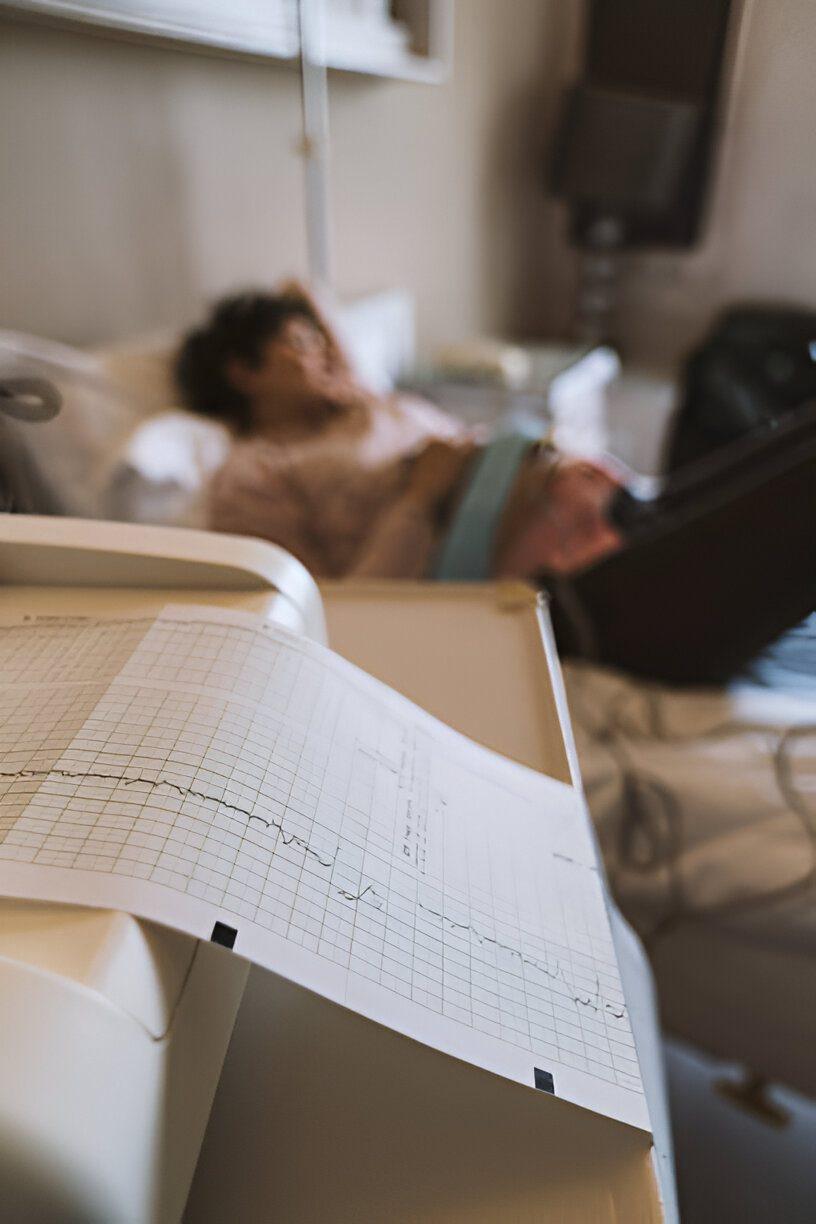The Profound Impact of Grief on the Heart
Grief is more than an emotional wound—it produces real, physical consequences, particularly affecting the heart. Many grieving individuals notice chest pain, shortness of breath, or irregular heartbeats and worry they’re having a heart attack. In some cases, these symptoms are temporary stress responses; in others, grief can trigger severe heart conditions such as:
🔹 Broken Heart Syndrome (Takotsubo Cardiomyopathy)
🔹 Increased Risk of Heart Attacks
🔹 Chronic Cardiovascular Strain
Understanding why grief affects the heart can help people navigate loss with awareness, self-care, and preventative measures to protect their well-being.
How Grief Disrupts the Body’s Natural Balance

The Role of Stress Hormones in Grief-Related Weight Change
Grief induces a physiological stress response, shifting hunger cues, digestion, and energy usage:
- 🔹 Cortisol Overload (Stress Weight Gain): During grief, cortisol—the stress hormone—rises, triggering cravings for high-calorie “comfort” foods. Sugary, fatty, or salty options offer fleeting relief but may lead to unwanted weight gain.
- 🔹 Adrenaline Surge (Grief Weight Loss): Others experience spikes of adrenaline/norepinephrine, muting appetite and hastening unintentional weight loss.
- 🔹 Serotonin and Dopamine Imbalance: Grief dampens these “feel-good” neurotransmitters, leaving some people uninterested in eating while others seek solace in food.
🎭 Analogy: Think of your body as a finely tuned instrument—grief throws it out of tune, making hunger cues either too loud or too quiet.
Emotional Loss Meets Physical Strain: Understanding Grief’s Toll on the Heart
A beloved person’s death can leave the heart figuratively shattered—but the truth is, loss can literally strain the heart muscle. Research confirms the correlation between profound sadness and cardiovascular risk, illuminating conditions like Broken Heart Syndrome. With this knowledge, individuals grappling with grief can take steps to safeguard heart health while processing emotional devastation.
What Is Broken Heart Syndrome?
Broken Heart Syndrome—Takotsubo Cardiomyopathy—is an acute condition where intense emotional distress temporarily weakens the heart muscle.
- Symptoms often mimic a heart attack: chest pain, shortness of breath, irregular heartbeat, dizziness.
- Ballooning Left Ventricle: The heart’s shape resembles a takotsubo (octopus trap), hence the name.
- Surge of Stress Hormones (adrenaline, cortisol) stuns the heart, impairing blood-pumping capacity.
🎭 Analogy: Think of an earthquake shaking a city. Though the city still stands, its foundations are temporarily unstable—mirroring how grief-induced stress can undermine heart function.
While most recover within weeks, Broken Heart Syndrome can sometimes lead to heart failure or death, stressing the importance of early recognition and care.
Who Is Most at Risk?
Grief-based heart complications can strike anyone, yet certain groups face higher vulnerability:
- 🔹 Older Adults: Losing a spouse late in life significantly increases cardiac risks.
- 🔹 Pre-Existing Heart Conditions: Hypertension, arrhythmias, or diabetes multiply the likelihood of complications.
- 🔹 Women: Postmenopausal women disproportionately encounter Broken Heart Syndrome due to hormonal factors.
- 🔹 Individuals with Chronic Stress or Anxiety: Already elevated stress levels intensify grief’s physiological effects.
📝 Personal Reflection:
“One widow recounted persistent chest tightness after her husband’s death. Initially dismissed as ‘just stress,’ she soon developed hypertension—her body’s response to the emotional havoc of loss.”
How Grief Affects the Heart
Grief is not purely emotional—it can heavily tax the cardiovascular system, especially in the initial weeks and months after a deep loss.
1. Increased Risk of Heart Attacks
- 🔹 Risk Elevation after Losing a Loved One: Studies show heart attack likelihood spikes in the first days and weeks post-bereavement.
- 🔹 Prolonged Grief → Chronic Cardiovascular Strain: Ongoing sorrow may contribute to heart disease over time.
2. Irregular Heart Rhythms (Arrhythmias)
- 🔹 Stress & Anxiety can disrupt the heart’s electrical system, leading to palpitations or AFib (atrial fibrillation).
- 🔹 A Journal of the American Heart Association found those recently bereaved had a heightened AFib risk, increasing stroke potential.
3. Elevated Blood Pressure and Inflammation
- 🔹 Cortisol Release: Constricts blood vessels, elevates blood pressure.
- 🔹 Chronic Inflammation: Prolonged sorrow raises inflammatory markers, heightening chances of heart disease or stroke.
🎭 Analogy: Picture the heart as a car engine—grief floors the gas pedal, causing overdrive and boosting odds of a mechanical breakdown.
“After I lost my husband, I felt an ache in my chest that wouldn’t go away. Doctors said it was ‘just stress,’ but months later, I was diagnosed with hypertension I’d never had before.”
— Beverly Linovitz
How to Protect Your Heart While Grieving
1. Recognize Heart Distress Signs
- ✅ Seek Medical Help: Chest pain, breathlessness, dizziness, or erratic heartbeat warrant immediate attention. Better to rule out serious issues than ignore them.
2. Practice Stress-Reduction Techniques
- 🔹 Deep Breathing & Meditation: Lower cortisol levels, stabilizing the body’s fight-or-flight response.
- 🔹 Progressive Muscle Relaxation: Relaxes tension built up from sorrow.
- 🔹 Gentle Exercise (Walking/Yoga): Enhances circulation, helps regulate blood pressure.
3. Maintain Healthy Lifestyle Habits
- ✅ Stay Hydrated: Dehydration burdens the heart.
- ✅ Eat Heart-Friendly Foods: Emphasize omega-3s (fish), fiber (whole grains), and anti-inflammatory produce.
- ✅ Limit Caffeine/Alcohol: Overconsumption can raise blood pressure and worsen stress on the heart.
- ✅ Prioritize Sleep: Insomnia or poor rest aggravates inflammation and cardiac strain.
4. Seek Emotional & Social Support
- 🔹 Grief Isn’t for Solitary Endurance: Connecting with loved ones, or attending a grief group, alleviates emotional stress.
- 🔹 Therapy/ Counseling: Professional help can ease overwhelming emotions, lowering heart strain.
🎭 Analogy: Just as a cracked bridge needs reinforcement, a grieving heart needs calm, care, and understanding to remain sturdy.
5. Follow Up with a Doctor
- ✅ Cardiac Check-Ups: If heart disease or high blood pressure is already a concern, schedule post-loss appointments for monitoring.
- ✅ Medications When Necessary: Temporary use of beta-blockers or similar medications may ease acute cardiac stress.
Things To Try This Week
Learn a Simple Breathing Exercise
-
- Practicing 4-7-8 breathing (inhale 4s, hold 7s, exhale 8s) can steady your pulse and reduce stress hormones.
Incorporate Heart-Healthy Foods
-
- Swap in more fruits, vegetables, and fish with omega-3s—these help combat inflammation caused by grief.
Schedule a Check-Up
-
- If you’re at higher risk (older, pre-existing conditions), plan a visit to discuss heart health with a doctor. Early awareness is key.
Conclusion
Grief and Heart Health Are Deeply Connected
Grief isn’t just a wound of the soul—it tangibly affects the physical heart, sometimes leading to life-threatening conditions like Broken Heart Syndrome or heightened heart attack risk. But knowing the dangers allows you to take proactive steps—staying aware of symptoms, managing stress, and leaning on emotional and medical support.
While losing someone dear may shock the foundation of your world, your heart can stay resilient with proper care, guidance, and empathy. If chest pain or palpitations arise post-loss, don’t downplay them—listen to your body and seek help.
🎭 Final Analogy: Grief is a storm, and the heart is our vessel. By reinforcing that vessel with cautious self-care and sincere support, we can endure even the fiercest swells—eventually finding calmer waters.
Your heart is grieving, too. Give it the care and time it needs to heal.
Grief’s resonance can extend to every heartbeat, reminding us that emotional turmoil and physical well-being are inseparable.
Embracing supportive routines and caring gestures safeguards both your body and your spirit during life’s deepest losses. Explore our cherish collections below for gentle resources, comforting items, and community understanding—nurturing your heart in the aftermath of heartbreak.
More Reflections, More Growth
Loss is complex, and the road to healing is different for everyone. These reflections offer insight, support, and guidance as you navigate this journey.
The Physical and Emotional Symptoms of Grief: Understanding the Whole-Body Impact
Grief affects both the mind and the body, leading to emotional struggles and physical symptoms like fatigue, sleep disturbances, and aches. This guide explores the signs of grief and offers coping strategies for managing its impact on your emotional and physical well-being.
Disenfranchised Grief: Mourning Losses That Society Overlooks
Disenfranchised grief refers to mourning losses that society does not acknowledge, making the grieving process more difficult. This guide offers strategies to validate and cope with grief when your loss is not openly recognized or supported.
The Grief Before Goodbye
Anticipatory grief occurs before a loved one’s passing and involves emotional preparation for loss. This guide explores the unique challenges of anticipatory grief, offering strategies for emotional support, self-care, and creating lasting memories with loved ones.
The Five Stages of Grief: A Comprehensive Guide
The five stages of grief—denial, anger, bargaining, depression, and acceptance—are a well-known framework for understanding the emotional journey of loss. This guide delves into each stage, explaining how grief unfolds and emphasizing the personal nature of the grieving process.
The Science of Sorrow: What Happens in the Brain When We Grieve
Grief isn’t just an emotional experience—it’s a biological one that rewires the brain. This guide explores the science behind grief, shedding light on how the brain processes loss and adapts to life after a loved one’s passing.
The Invisible Line Between Grief and Depression
Grief and depression can overlap, but understanding the key differences is crucial. This article explores how grief is a natural response to loss, while depression is a mental health condition, offering guidance on when grief may need additional support.
The Unspoken Heartache: Understanding the Quiet Grief of Miscarriage
Miscarriage is a silent grief that touches one in four pregnancies, yet it remains unspoken for many. Explore the layers of loss, the cultural silence, and ways to support healing through acknowledgment and empathy.
When Parenthood Dreams Stall: Navigating Infertility with Compassion
Infertility is a deeply personal journey that affects physical, emotional, and relational well-being. Discover how compassion—both self-directed and from others—can transform this experience into one of resilience and connection.
When Hope Falls Silent: Finding Support After Pregnancy Loss
Pregnancy loss is a deeply personal experience, often shrouded in silence. Learn how to find support—from medical care to community connections—and navigate the complex grief with compassion and hope.
Explore Journeys of Healing and Solace:
Discover dedicated spaces that offer understanding, guidance, and connection through grief. From the loss of loved ones to life’s challenging transitions, each category provides a pathway to reflect, connect, and find peace in shared experiences.


























